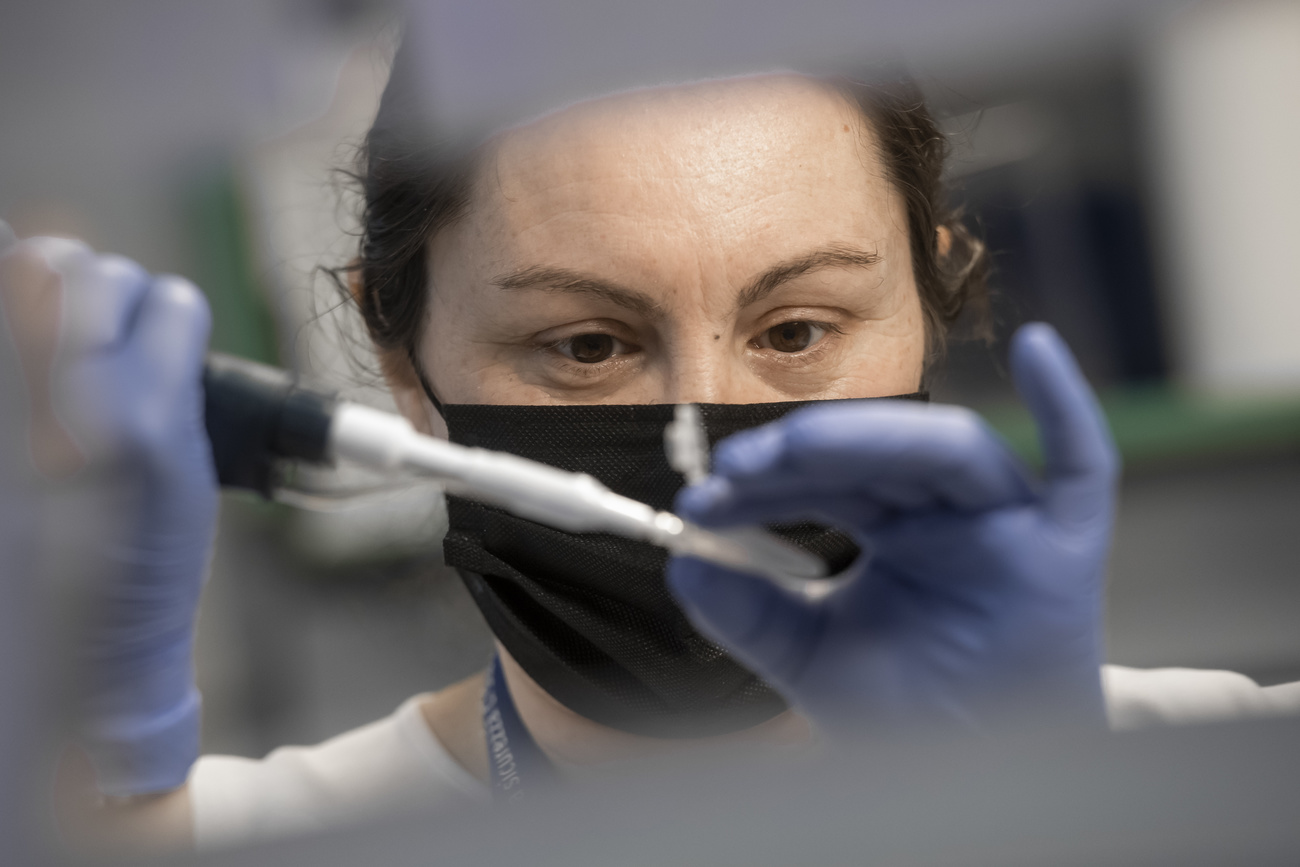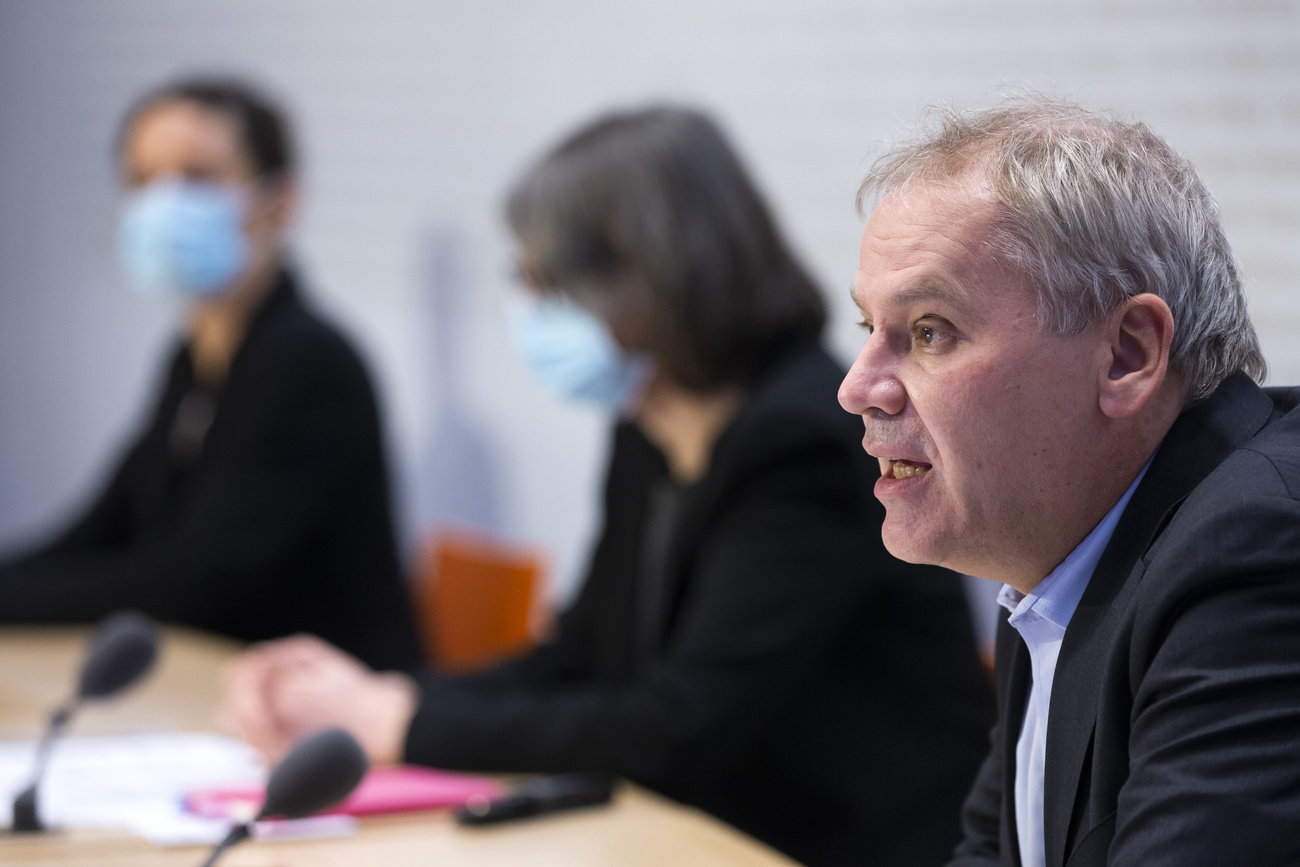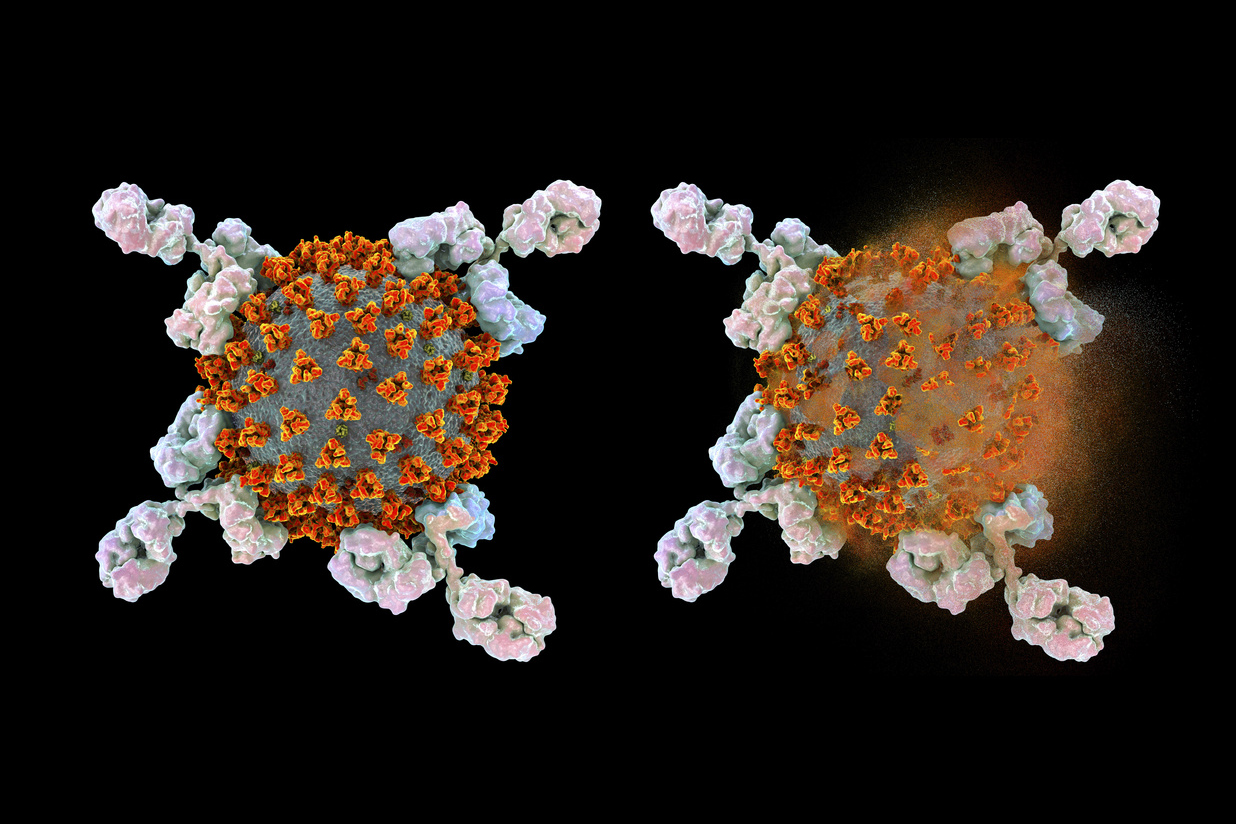Omicron variant enters Switzerland. Will we be able to save Christmas?
Christmas is coming, but what kind of Christmas will it be? Many of us were already planning family holidays or a much-needed winter trip to some exotic destination. And then along came Omicron, yet another 'worrying' variant of the coronavirus.
The variant has so far been identified in more than 20 countries, including Switzerland, where three people have been placed in isolation. But how worried should we be? Despite the fact that the World Health Organization (WHO) has classified this variant as ‘worrying’ External linkbecause of certain characteristics that could make it more transmissible and risky, there are still many uncertainties. The WHO expects to receive more information on transmissibilityExternal link ‘within a few days’.
Epidemiologist Emma Hodcroft of the Bern Institute of Social and Preventive Medicine explained on British TV that the Omicron mutation might not be recognised by the immune system.
Epidemiologist Dr Emma Hodcroft explains how Omicron's mutations mean our immune systems might not recognise the virus so well.
— ITV News (@itvnews) December 1, 2021External link
She uses the analogy of how we recognise faces – if someone changes their appearance we might not instantly know themhttps://t.co/7NmZXrffhJExternal link pic.twitter.com/tXBDAc3VyUExternal link
“What differentiates the Omicron variant from the others is that it has many mutations, especially at the level of the spike protein. The spike protein is the part of the virus that allows it to penetrate cells (…) and it is also the part that the body learns to recognise if you were previously infected or vaccinated. But the body uses very specific parts of the spike protein, the ones that are easiest to recognise (…), so if this protein is mutated the immune system may not recognise the virus,’ says Hodcroft.
However, she points out that it is also likely that the body learns to recognise different parts of the virus and can detect small changes, which is why the effects of this mutation are still uncertain.
In an interview with SWI swissinfo.ch some time ago, Hodcroft explained that the longer the virus replicates, the greater the risk of mutation. “The longer we play this game, the higher the odds are that the next mutation will be one we don’t want to see,” she said. That’s why it’s important to keep infections down and contain the spread of variants as much as possible.

More
‘The virus is always evolving’
In Switzerland, health authorities have stated that the Omicron variant could pose a new health risk and affect the future course of the pandemic, worsening the outlook for the coming weeks and months.

More
Omicron could “change course of pandemic”
The advice, therefore, remains to get vaccinated or have a booster dose.
What do you think about the current situation? Does the Omicron variant scare you? Are you changing your plans for the winter holidays? Let me know your opinion!
Escaping vaccines and lockdown
“I don’t understand why there are so many cases even though so many people are vaccinated,” asked Lydia*, an Austrian girl I met last week in Fuerteventura, during a yoga retreat. Neither Lydia nor her sister Sylvia* are vaccinated. They live in a small village near Salzburg, in one of the provinces most affected by the coronavirus, where the percentage of people vaccinated with two doses is 59.5%, below the European average (66.2%).
Austria recently reintroduced a temporary lockdown after a worrying rise in the number of cases and is the only European country to have introduced compulsory vaccination from 2022.
“We came here to escape the madness going on in our country,” the two sisters say.
But Alexander Schallenberg, Austria’s new Chancellor, who was born in Bern and took over after the resignation of the previous head of government Sebastian Kurz, believes that Austria must do more to convince the population to get vaccinated and has spoken of an “attack on the health system”External link by some political forces, vaccine sceptics and disinformation.
The Viennese authorities fear that the current rate of people vaccinated with two doses (66.9%) will not be enough to cope with the winter and the new variant, even though hospitals are not under the same pressure as at the beginning of the pandemic, mainly thanks to the vaccines.
The chart by the European Centre for Disease PreventionExternal link and Control shows that, in Europe, the countries with the highest rate of fully vaccinated individuals are those where there have been the fewest coronavirus deaths.
Just on Wednesday, European Commission President Ursula Von der Leyen also opened up to the idea of compulsory vaccinationExternal link in the EU, calling on member states to start a discussion along these lines. “The EU is a unique epidemiological region,” Von der Leyen said. “What we agree on is to have a person-based approach and not borders, which the virus does not respect. For this we need testing, tracking, social distancing and masks, which we have seen work,” she added, talking about measures to counter the new variant.
Germany immediately accepted the invitation and reacted to the explosion of cases by imposing a nationwide lockdown on unvaccinatedExternal link. Like neighbouring Austria, Germany could also make vaccination compulsory from February 2022.
What do you think about compulsory vaccination? Could it help us crack down on the pandemic or is it inappropriate? Send me your comments and opinions.
Why do some people end up in intensive care and others develop only a mild cold?
Omicron is bad news, but good news comes from science. Two studies involving Swiss scientists have shown that genes and blood glucose levels play a crucial role in the course of coronavirus disease. These findings, along with other known risk factors, help explain why some people are more severely affected by Covid-19 than others.
This could pave the way for the use of machine learning methods to identify people most at risk of contracting the virus, predict severe cases and understand who needs priority treatment.

More
It’s not all about age: why Covid hits some people harder than others
“It is very difficult for us doctors to work during a pandemic. Sometimes so many patients come in that it is complicated to understand who is at risk of developing a severe form of Covid-19 and who is not, especially under time pressure. It’s a great help to have more elements of assessment,” Dimitri Patriki, a doctor at Baden Cantonal Hospital, told us. During the first wave of Covid-19, Patriki sometimes saw whole families coming in seriously ill with Covid-19 without any pre-existing disease. That’s how he thought genes might have something to do with it.
Having a complete picture of risk factors could help healthcare professionals predict Covid-19 behaviour in patients. “I hope we will get to the point where we can test genetic markers to tell a person if they have a very high risk of getting Covid-19 or getting seriously ill,” the doctor hopes.
Since we are likely to have to live with this pandemic for a long time to come, we’d better have a few extra tricks up our sleeves.
Do you have any comments, remarks or questions about the latest news from the world of science? Let’s talk about it over (virtual) coffee.
* The real names of the two girls have been replaced with fictional names.

In compliance with the JTI standards
More: SWI swissinfo.ch certified by the Journalism Trust Initiative








You can find an overview of ongoing debates with our journalists here . Please join us!
If you want to start a conversation about a topic raised in this article or want to report factual errors, email us at english@swissinfo.ch.